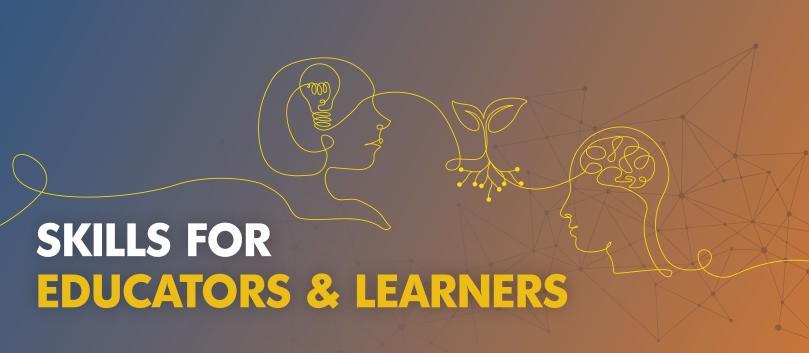
Skills for educators and learners – ETF communication campaign
Pedagogical skills, subject knowledge, and an eagerness to adapt and update them in response to challenges and opportunities in the environment, as with the green and digital transitions, are essential for today’s educators. They also need strong social skills, whether engaging face to face or virtually with learners, as the societal issues of the world at large, such as migration, are played out in the classroom microcosm.
The European Training Foundation (ETF) is working with countries in the EU’s neighbouring regions to better understand and respond to the skills development needs of educators and learners, in partnership with other organisations, including UNICEF and UNESCO, in support of the United Nations Sustainable Development Goals. Through dialogue with key stakeholders – including teachers and learners, teachers’ associations and trade unions, and student bodies, the ETF advises and informs the policy process and reform in each country to best fit each unique situation.
Throughout September and October, our communication campaign focuses on supporting educators’ professional development and improving the teaching and learning process. We address challenges like updating curricula and understanding the risks and opportunities of new influences, such as artificial intelligence and evolving job markets, including less predictable career paths.
The ETF helps educators and learners connect at local, national, and global levels by creating professional networks. These networks offer more chances for professional growth, peer learning, and involvement in policy dialogue about public education policies, all aimed at improving education systems for everyone.
Find out more
Policy analysis and progress monitoring
- Torino Process: a periodical assessment measuring the effectiveness of vocational education system reforms in partner countries, it includes indicators to collect data on teaching and learning policies. Findings lead to recommendations for policy and potential follow-up actions.
- Osnabrück Declaration on vocational education and training: supports the development of teachers and trainers in the EU candidate countries in the Western Balkans.
Innovating teaching and learning
- Creating New Learning initiative: targets innovation in teaching and learning by connecting learning environments, supporting personalised and differentiated learning, introducing new methods and ideas in curricula to optimise key competence learning, digital and online learning, and enhance the qualifications of educators.
- Join ETF Community of Innovative Educators
- Identifying and evaluating innovations in teaching and learning, aimed at improving quality and at sharing best practices with ETF partner countries: a key aspect of ETF work – Serbia pilot project
Continuing professional development
- ETF Network for Excellence: stimulates the sharing of ideas, practices and experience between centres of vocational excellence at both national and international levels. These centres work together to improve in specific domains, such as the digitalisation of teaching and learning.
- ETF report Listening to vocational teachers and principals: examines the professional development needs and learning offer for teachers across nine countries.
Ensuring quality, relevance and inclusion in teaching and learning
- ETF mapping instrument for quality assurance in vocational education and training (VET): implemented in the countries that are members of the ETF’s Forum for Quality Assurance in VET, it supports the continuing professional development of teachers aligning with the European Quality Assurance Reference Framework for VET.
- DARYA, an EU-funded project being implemented by the ETF: supports young people in Central Asia – with a focus on flexible and inclusive teaching and learning approaches, based on learning outcomes and relevant to the labour market as one of its thematic components.
- In cooperation with UNICEF, the ETF encourages young people to voice their opinion on education, teaching and learning, and contribute to the debate on the reform of education systems (see more info).
Tools
- READY model (Reference model for educators’ activities and development in the 21st century): offers a structured way to identify the professional practices and development needs of 21st-century educators.
- Digital Needs Analysis for Teachers Tool: helps teachers identify their digital training needs.
- SELFIE: an EU diagnostic tool at school level for improving digital readiness and advancing teachers’ digital competence. It is being implemented in partner countries with ETF support.